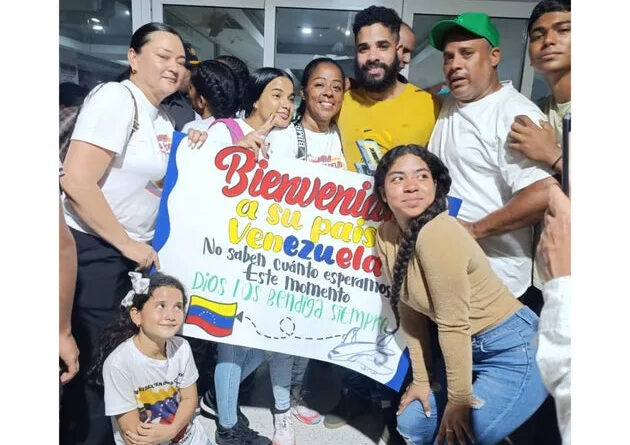His Family Has Spent Months Trying To Free Him From CECOT. They Finally Reunited.

Ysqueibel Yonaiquer Peñaloza Chirinos reunited with his family on Friday after 125 days of detention without charge in an infamous Salvadoran megaprison. Ydalys Chirinos-Polanco
When U.S. officials disappeared hundreds of Venezuelan immigrants to an infamous megaprison in El Salvador in March, many of the detainees’ family members wondered if they would ever see their loved ones again. El Centro de Confinamiento del Terrorismo, or CECOT, is known for its extremely harsh conditions — and for never letting its prisoners go free.
But on Friday evening, some of these families were reunited as the result of a prisoner swap that returned 252 men in CECOT to Venezuela, in exchange for Venezuela releasing 10 Americans it had seized.
Earlier that day, rumors of the swap began trickling through the community of CECOT family members, who had spent months fighting to bring their loved ones home. Some received phone calls from the Venezuelan government and spread the word to others through an unofficial phone tree. Those who could make the trip traveled to Maiquetia, where the detainees were expected to arrive. Those who couldn’t travel anxiously searched for photos or videos of the plane landing, hoping to catch a glimpse of their loved ones disembarking.
For months, CECOT detainees had been held incommunicado with no access to their families or lawyers. The only proof of life some family members received was when they were able to spot their loved one on propaganda materials released by government officials.
A little after 9 p.m. local time Friday, Ydalys Chirinos-Polanco texted HuffPost a photo of her beaming next to her 25-year-old son, Ysqueibel Yonaiquer Peñaloza Chirinos. They posed behind a sign that read in Spanish: “Welcome to your country Venezuela. You don’t know how long we’ve waited for this moment. God bless you always.”
Chirinos also shared a video of her son surrounded by family, clamoring to hug and kiss him. In a voice memo to HuffPost, Chirinos expressed gratitude for a “wonderful joy” and “beautiful miracle.”
“My son is with me again. Thank you, thank you, my god, thank you,” she said in Spanish.
Peñaloza is one of many former CECOT detainees who came to the U.S. legally and had pending asylum claims when U.S. officials abruptly flew them to El Salvador in March. He came to the U.S. through a pre-scheduled appointment on CBP One, the cellphone app used by the Biden administration to process asylum seekers. Peñaloza had a legal right to make a case in immigration court as to why he should stay in the U.S.
But before he could exercise that right, President Donald Trump invoked the Alien Enemies Act, a wartime authority last used in World War II, and claimed that a gang called Tren de Aragua was essentially an invading army working with the Venezuelan government. The Trump administration claimed that the Venezuelans it sent to CECOT were Tren de Aragua members, but has provided little evidence beyond common tattoos to support these allegations.
“He left Venezuela for a better future and it turned into a nightmare,” Chirinos told The Independent.
Peñaloza and the other men were flown to CECOT in defiance of a court order and held indefinitely without charge. The U.S. government paid the Salvadoran government millions of dollars to detain them. Once forcibly removed from the U.S., government officials began asking immigration judges to dismiss their pending immigration cases, citing the fact that they were no longer present in the U.S.
Peñaloza, who was one of at least 60 CECOT detainees with pending asylum claims, had his case dismissed while he was detained in El Salvador. Margaret Cargioli, a lawyer with Immigrant Defenders Law Center, was prepared to argue his case in court without him, but the judge canceled the hearing ahead of time.
“While the Trump administration disappears human beings to countries around the world without due process, it will take all of us, from all over the world, to help free the human beings callously sent to dangerous places such as CECOT and prevent others from experiencing the same cruel fate,” Cargioli said in a statement on Friday.
